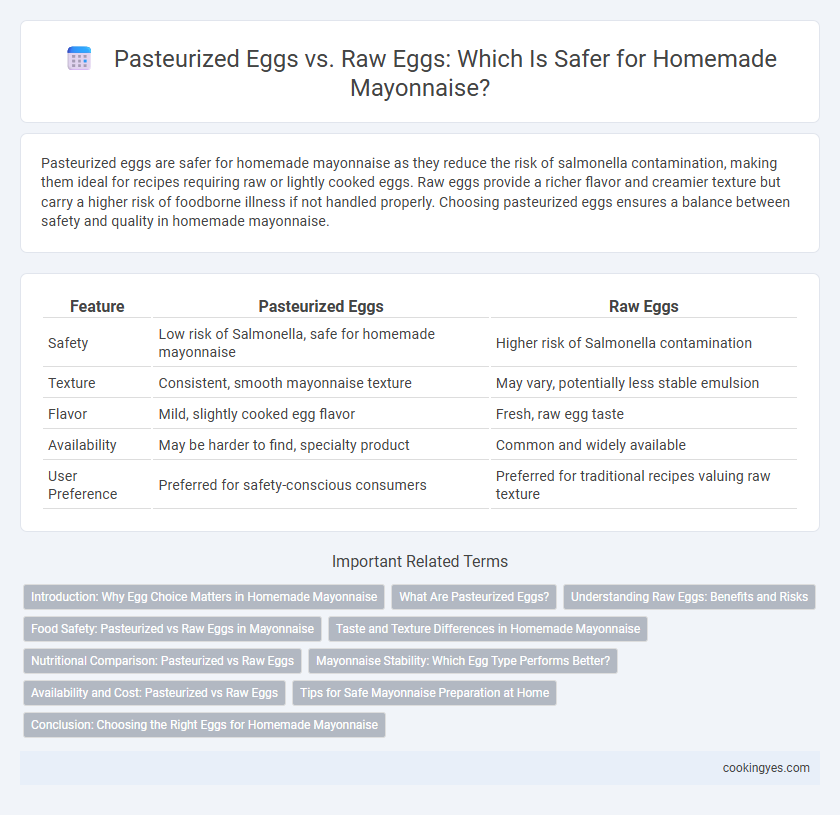Pasteurized eggs are safer for homemade mayonnaise as they reduce the risk of salmonella contamination, making them ideal for recipes requiring raw or lightly cooked eggs. Raw eggs provide a richer flavor and creamier texture but carry a higher risk of foodborne illness if not handled properly. Choosing pasteurized eggs ensures a balance between safety and quality in homemade mayonnaise.
Table of Comparison
| Feature | Pasteurized Eggs | Raw Eggs |
|---|---|---|
| Safety | Low risk of Salmonella, safe for homemade mayonnaise | Higher risk of Salmonella contamination |
| Texture | Consistent, smooth mayonnaise texture | May vary, potentially less stable emulsion |
| Flavor | Mild, slightly cooked egg flavor | Fresh, raw egg taste |
| Availability | May be harder to find, specialty product | Common and widely available |
| User Preference | Preferred for safety-conscious consumers | Preferred for traditional recipes valuing raw texture |
Introduction: Why Egg Choice Matters in Homemade Mayonnaise
Choosing pasteurized eggs for homemade mayonnaise significantly reduces the risk of Salmonella contamination, ensuring food safety without compromising taste or texture. Raw eggs, while traditional, carry a higher bacterial risk that can lead to foodborne illnesses, especially when consumed raw or lightly cooked. Pasteurized eggs provide a safer alternative, maintaining the creamy consistency essential for perfect mayonnaise.
What Are Pasteurized Eggs?
Pasteurized eggs are eggs that have been gently heated to a specific temperature to eliminate harmful bacteria such as Salmonella without cooking the egg inside, making them safer for raw consumption. This process helps maintain the eggs' texture and flavor, making pasteurized eggs an ideal choice for homemade mayonnaise where raw eggs are often used. Using pasteurized eggs reduces the risk of foodborne illness while preserving the creamy, rich consistency essential for a perfect homemade mayonnaise.
Understanding Raw Eggs: Benefits and Risks
Raw eggs contain natural enzymes and proteins that enhance the rich texture and flavor of homemade mayonnaise, offering superior taste and creaminess. However, raw eggs carry a risk of Salmonella contamination, which can lead to serious foodborne illness, especially in vulnerable populations like children, pregnant women, and the elderly. Pasteurized eggs undergo a gentle heat treatment to eliminate pathogens while preserving most of the eggs' functional properties, providing a safer alternative for mayonnaise preparation without compromising quality.
Food Safety: Pasteurized vs Raw Eggs in Mayonnaise
Pasteurized eggs significantly reduce the risk of Salmonella contamination in homemade mayonnaise, making them a safer choice compared to raw eggs. Raw eggs, while traditional in many mayonnaise recipes, carry a higher risk of bacterial infection, especially for vulnerable populations such as pregnant women, young children, and the elderly. Using pasteurized eggs ensures food safety without compromising the creamy texture and flavor of homemade mayonnaise.
Taste and Texture Differences in Homemade Mayonnaise
Pasteurized eggs create a smoother, creamier texture in homemade mayonnaise, reducing the risk of foodborne illness without compromising flavor. Raw eggs contribute a richer, more robust taste and a slightly thicker consistency, valued in traditional recipes for their natural emulsifying properties. The choice between pasteurized and raw eggs impacts both the safety profile and the sensory experience, with pasteurized eggs offering safer consumption and raw eggs providing a fuller flavor.
Nutritional Comparison: Pasteurized vs Raw Eggs
Pasteurized eggs for homemade mayonnaise offer a safer alternative by significantly reducing the risk of Salmonella contamination without compromising essential nutrients like protein and vitamins B2 and B12. Raw eggs retain their full natural enzyme activity and may provide slightly higher bioavailability of some nutrients, but the risk of foodborne illness is notably higher. Nutritionally, both pasteurized and raw eggs supply comparable amounts of fats, proteins, and micronutrients vital for a creamy and rich mayonnaise texture.
Mayonnaise Stability: Which Egg Type Performs Better?
Pasteurized eggs offer superior mayonnaise stability compared to raw eggs due to their reduced bacterial load and consistent protein structure, which enhances emulsification. The heat treatment in pasteurization denatures some proteins, resulting in a thicker, more stable emulsion that resists separation over time. While raw eggs can produce creamy mayonnaise, their higher risk of contamination and variable protein quality often lead to less stable emulsions and potential food safety concerns.
Availability and Cost: Pasteurized vs Raw Eggs
Pasteurized eggs are widely available in most grocery stores and typically come at a higher cost compared to raw eggs due to the additional processing required to eliminate bacteria. Raw eggs are cheaper and more readily accessible but carry a higher risk of bacterial contamination, which is a crucial factor when making homemade mayonnaise. Choosing pasteurized eggs enhances food safety without significantly compromising availability, while raw eggs offer cost savings but require careful handling.
Tips for Safe Mayonnaise Preparation at Home
Use pasteurized eggs when making homemade mayonnaise to reduce the risk of foodborne illness caused by Salmonella. Maintain proper hygiene by thoroughly washing hands and utensils, and store the mayonnaise in the refrigerator at or below 40degF (4degC) to prevent bacterial growth. Incorporate an acid like lemon juice or vinegar, which helps lower the pH and further inhibits harmful bacteria development in the sauce.
Conclusion: Choosing the Right Eggs for Homemade Mayonnaise
Pasteurized eggs offer a safer choice for homemade mayonnaise by significantly reducing the risk of Salmonella contamination without compromising texture or taste. Raw eggs provide a traditional flavor and creamy consistency but carry a higher risk of foodborne illness, especially for vulnerable groups like infants, pregnant women, and the elderly. Selecting pasteurized eggs balances food safety with quality, ensuring a smooth, delicious homemade mayonnaise that is safer to consume.
Pasteurized eggs vs Raw eggs for homemade mayonnaise Infographic

 cookingyes.com
cookingyes.com